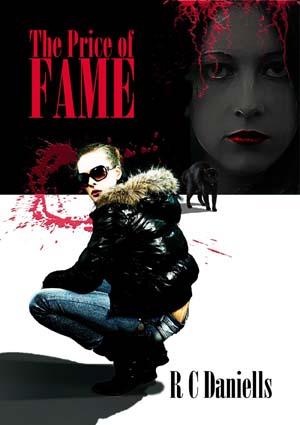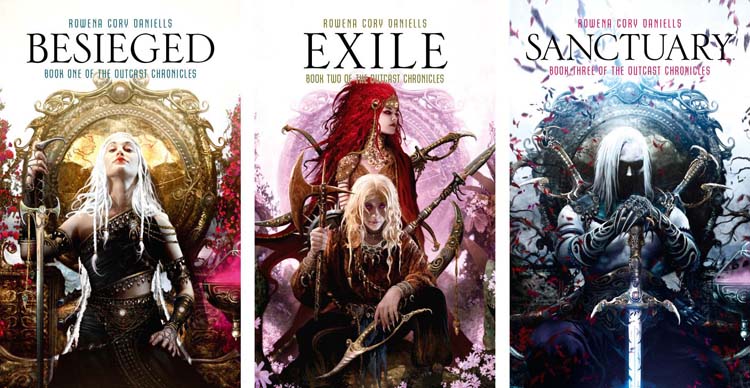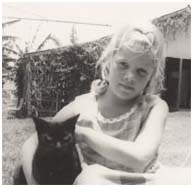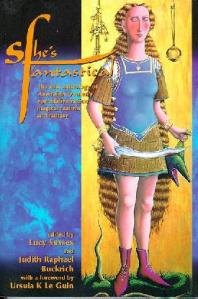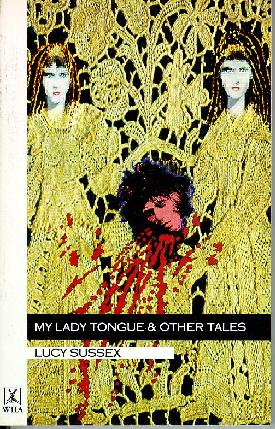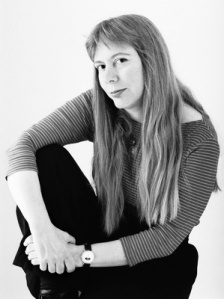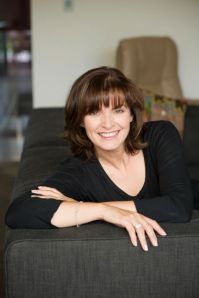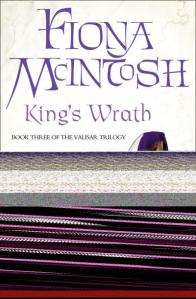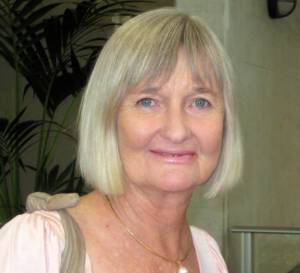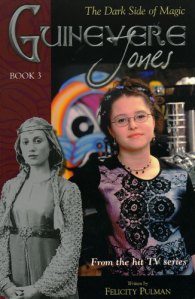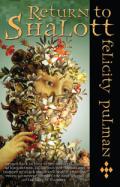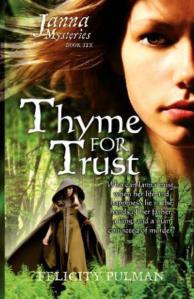I have been featuring fantastic female fantasy authors (see disclaimer) but this has morphed into interesting people in the speculative fiction world. Today I’ve invited the talented Narrelle Harris to drop by.
Watch out for the give-away question at the end of the interview.
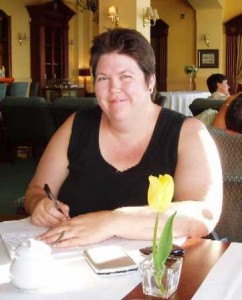 Q: You did a lot of travelling: ‘three years abroad, teaching English in Egypt and Poland’. Your husband is Tim Richards a travel writer and author. Does this mean that you two can travel all over the world and write it off your tax, (him – because he writes about it, you – because you are researching for your next book)?
Q: You did a lot of travelling: ‘three years abroad, teaching English in Egypt and Poland’. Your husband is Tim Richards a travel writer and author. Does this mean that you two can travel all over the world and write it off your tax, (him – because he writes about it, you – because you are researching for your next book)?
It’s not quite that neat! Tim can claim pretty much everything, as he is genuinely travelling for work. I could only claim if the primary reason for the travel was research, and I’d have to keep detailed diaries and all my receipts and actually produce something. While the places I go certainly informs my writing – one of my short stories in the upcoming Showtime anthology from Twelfth Planet Press was inspired by my trip to Hungary and is set there – I’m mainly going for a holiday and to watch my husband work. 😀
I have claimed other stuff on tax, though: anything I’m not sure about I just submit to the tax accountant, and they work out what applies. They are absolutely worth the money I pay them each year!
Q: When I read The Opposite of Life I really enjoyed the daggy, Hawaiian shirt-wearing vampire. (Charlaine Harris of True Blood fame gave it a great write up).Did you deliberately set out to break with the stereotypes when you wrote this book?
 It was one of the inspirations, yes. I’d been to see one of the Underworld films, with Kate Beckinsale, and thought once more about how film vampires are always slim and glamorous with fabulous hair and the most amazing fashion sense. I thought, if vampires were real and I got turned into one, I’d just be a chubby chick with fangs. That really was the first impetus. After that, as I wrote, I was trying to be as steeped in reality as the form would allow. Gary is the opposite of a glamorous vampire and Lissa is just a regular girl, not an outstanding beauty or anything: certainly not kickass slayer type. So yes, every time a scene would start looking like a regular set up for a glamour scene, I’d deliberately find ways to subvert that.
It was one of the inspirations, yes. I’d been to see one of the Underworld films, with Kate Beckinsale, and thought once more about how film vampires are always slim and glamorous with fabulous hair and the most amazing fashion sense. I thought, if vampires were real and I got turned into one, I’d just be a chubby chick with fangs. That really was the first impetus. After that, as I wrote, I was trying to be as steeped in reality as the form would allow. Gary is the opposite of a glamorous vampire and Lissa is just a regular girl, not an outstanding beauty or anything: certainly not kickass slayer type. So yes, every time a scene would start looking like a regular set up for a glamour scene, I’d deliberately find ways to subvert that.
Q: I see ClanDestine Press will be bringing out the sequel to The Opposite of Life, called Walking Shadows. Can you give us a hint of what Lissa and Gary get up to?
This is the blurb I put together for Clan Destine:
While the first book dealt with a murderous vampire breaking the 21st century vampire code of staying under the radar, Walking Shadows sees Gary and Lissa facing the arrival of a frighteningly successful vampire hunter, who is relentlessly picking off Melbourne’s small vampire community. Gary also has some secrets he’s never shared with Lissa, and Lissa’s learning even more about the unexpected downsides of being undead. Mundy, Melbourne’s oldest vampire, seems to hate Lissa and Magdalene, Melbourne meanest vampire and owner of the Gold Bug, isn’t much of a fan either. So Lissa and Gary have enemies no matter which way they turn.
All that while Lissa is trying to manage the return home of her alcoholic father and trying to convince her beloved sister Kate that Gary is not going to eat anyone.
Of course, before the end, there’s the blood, the killing, the fires and the running like the clappers for their lives.
 Q: You also write crime, or could it be that you write crime and also write dark fantasy? I’ve noticed a lot of authors have this cross over. Your first published book was Fly by Night. It looks like a collection of short stories or a novella, it’s hard to tell. Plus there is a novella Sacrifice, both are available as e-books. Do you find you are tempted to write in the short story/novella length?
Q: You also write crime, or could it be that you write crime and also write dark fantasy? I’ve noticed a lot of authors have this cross over. Your first published book was Fly by Night. It looks like a collection of short stories or a novella, it’s hard to tell. Plus there is a novella Sacrifice, both are available as e-books. Do you find you are tempted to write in the short story/novella length?
Fly By Night is two novellas (Fly by Night and Sacrifice) presented in a single volume. The book is out of print now, so I made them available as separate novellas on Smashwords and Amazon.com. They both deal with Frank and Milo, musicians at the start of their career, who are also a couple. In each story they stumble into violent crime.
Really, I find the novel a more natural length for me to write to. I seem to have so much to say! Having said that, I recently wrote some short stories, which are coming out in the aforementioned Showtime anthology, and I enjoyed doing those very much. I think I might try some more of those.
However, I’m about to get back to work on the third Gary and Lissa novel, and I have notes and ideas for several other books. I guess I’ll keep writing to whatever length a particular story needs.
Q: Witch Honour and Witch Faith were both shortlisted for the George Turner Awards, way back in the 1990s.They look like the sort of books to challenge publishers and bookstore owners – fantasy, SF and a bit of court politics. Are you more comfortable writing books that don’t fit neatly into a particular genre?
 There’s that old saying about there being no new stories, or that there are only seven stories, and everything you read is just a variation. When I write, I guess I try to find an approach that is just a new look at how to do something. That lends itself naturally to genre-blending. I’m fine with that. It’s been going on for much longer than I’ve been writing, anyway. It certainly gives you a lot of scope and room to play.
There’s that old saying about there being no new stories, or that there are only seven stories, and everything you read is just a variation. When I write, I guess I try to find an approach that is just a new look at how to do something. That lends itself naturally to genre-blending. I’m fine with that. It’s been going on for much longer than I’ve been writing, anyway. It certainly gives you a lot of scope and room to play.
Q: Your one-act play, Stalemate, was performed by harbour theatre and won Best Original Play at the Bunbury One-Act Drama Festival. What led you to write this play? Was it a thrill to see it performed live?
Originally, I wrote it response to a call for one-act plays that were ghost stories. It didn’t get picked up in that submission, but I sent it to a friend of mine in Perth, who had directed me in plays in community theatre when I lived in Fremantle. I was just wanting her input initially on how to improve it, and she wrote and asked if she could stage it at the one act festival our old theatre group was doing. From there it went to the Bunbury One Act Theatre Festival and picked up an award. I flew over to Perth to see it performed at Harbour Theatre, before it went to Bunbury.
And oh my god, yes, it was exciting to see what somebody else did with the words I wrote! With books, obviously every reader is interpreting things through their own experiences and tastes. With theatre, though, you get to *see* how that other person is interpreting things. The production was a little unusual in that the woman playing the mother got very ill just before it went on and couldn’t perform. So instead of recasting, the director, Celia, read the part off-stage while the woman playing Helen played to the space where the other actress was meant to be. They’d rehearsed all the moves, after all. The mother is a ghost, so it worked well. It would have been a disaster the other way around!
But yes – very exciting to see that collaboration with the director and performers presenting their interpretation of the story. I think I cried.
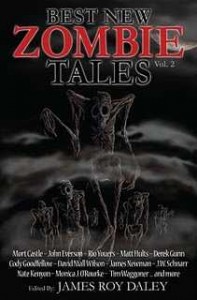 Q: I see you had a story in Best New Zombie Tales, (vol 2) edited by James Roy Daley. What is it about zombies that makes them so popular?
Q: I see you had a story in Best New Zombie Tales, (vol 2) edited by James Roy Daley. What is it about zombies that makes them so popular?
That was my first foray into zombie fiction, so I’m not sure. I suppose with vampires, the fanged one can represent all kinds of metaphors, and we project a lot of different fears and desires onto them. Perhaps with zombies, they make us reflect those fears and desires back onto ourselves. Seriously, I’m just making this up on the spot. I don’t really know. But I’ve been reading some terrific zombie fiction lately, and most of it seems to contain themes of people turning inward, finding out more about themselves through how they respond to the zombie apocalypse. The Walking Dead TV series is exploring the idea that how we respond to these tragic (though dangerous) creatures questions and reflects our compassion and humanity. Felicity Dowker wrote a beautiful story about zombies, love and how much worse surviving people were than the undead.
 Q: Outside the Law is a collection of True Crime essays. What did you research and write about for this collection?
Q: Outside the Law is a collection of True Crime essays. What did you research and write about for this collection?
I had just done jury duty for the first time ever, and became quite interested in how some fellow jurors thought about forensic evidence and the presentation of evidence generally. A few weeks later, Lindy Cameron said she was looking for essays for the collection, so I pitched that idea. Then I interviewed doctors, lawyers and forensic scientists about the issue, and whether too much forensic TV was affecting how juries operated in Australia. It was fascinating!
Q: Talk about versatility, you also write Phone Apps. Melbourne Historical, Melbourne Getaways and Melbourne Literary. How did you get involved in this?
Actually, only Melbourne Literary is my app – the other two were done by my husband, but I’ve linked to them from my site to help him promote them. I’m working on a new Melbourne app now, though, so his will probably get bumped when that’s ready!
The app happened through Tim, actually. He does contract work for Lonely Planet, and this US company, Sutro Media, sent an email around the LP Author mailing group to say they were looking for folks to write apps for them. Sutro has the software and what amounts to a content management system, but they want good writers to partner with them to create content. Tim started doing Melbourne Historical and, seeing how the categories and layout worked, I began thinking about all the literary stuff around Melbourne and how it would fit into that format. Melbourne had been declared a UNESCO City of Literature and the Wheeler Centre had just opened, so it seemed a good fit and a potential seller. So I pitched that, Sutro liked it, and off we went.
Q: I was prompted to start this series of interviews because there seems to be a perception in the US and the UK that fantasy is a bit of a boy’s club. Do you think there’s a difference in the way males and females write fantasy?
 I honestly couldn’t say! I mean, there may be some kinds of fantasy where you’d think ‘well, that’s probably a male writer for a male audience’, with lots of hairy barbarians, wenches and quaffing of ale; or women writing for a female audience with… I don’t know, magic and … dragons? Even writing that down feels terribly sexist and stereotypical. Gaiman writes like Gaiman, Bujold writes like Bujold, they both write about humanity, with a philosophical heart. No doubt they are informed by their gender, but I don’t think they write *from* gender. If that makes sense.
I honestly couldn’t say! I mean, there may be some kinds of fantasy where you’d think ‘well, that’s probably a male writer for a male audience’, with lots of hairy barbarians, wenches and quaffing of ale; or women writing for a female audience with… I don’t know, magic and … dragons? Even writing that down feels terribly sexist and stereotypical. Gaiman writes like Gaiman, Bujold writes like Bujold, they both write about humanity, with a philosophical heart. No doubt they are informed by their gender, but I don’t think they write *from* gender. If that makes sense.
I read a lot of fantasy, but I read a lot of SF, crime and ‘mainstream’ fiction as well as non fiction. I read both men and women, adult and YA. Good writing is good writing. Writing romantic relationships isn’t just a woman’s thing, writing action isn’t just a man’s thing.
Maybe there’s a difference in what some male or female readers choose to read; and there are obvious differences in writers and writing styles, but I don’t know that it can be split into gender differences like that.
Q: Following on from that, does the gender of the writer change your expectations when you pick up their book?
Not really. I’m very bored by gender stereotypes no matter who is writing them. If a book is full of simplistic gender roles and sexist claptrap, I’ll generally put it down long before I finish it. I don’t get a lot of time, and life’s too short to read books I’m not enjoying.
 Q: And here’s the fun question. If you could book a trip on a time machine, where and when would you go, and why?
Q: And here’s the fun question. If you could book a trip on a time machine, where and when would you go, and why?
I think the Marvellous Melbourne period of the late 1800s would be fascinating, but I’d really want to have a first aid kit containing penicillin with me. And lots of money. I’d like to see old Melbourne in style. I moved to Melbourne in 1998 and have taken into my heart with a passion. I’ve lived all over Australia, an in Egypt and Poland, is this was the first city where I thought I could live here permanently. Seeing her in her goldrush heyday would be such a treat. Meeting those characters, like George Coppin, Fergus Hume and Madam Brussels would be a hoot too. I kind of fancy myself in Victorian era dresses as well. I used to be a member of a Sherlock Holmes society and occasionally cut a bit of a dash in those long frocks with long gloves and fancy hats.
Give-away Question:
Narrelle has a copy of Best New Zombie Tales Volume Two (with her story The Truth About Brains) and a copy of The Opposite of Life to give away. She says, to win one of them:
Tell me whether you like zombie or vampire stories best, and why. The best zombie-lovin’ answer will get Brains and the best vampire-lovin’ answer will get the opposite! ;D
Follow Narrelle on Twitter: @daggyvamp
See Narrelle’s Blog
See two of Narrelle’s characters blog.
Catch up with Narrelle on Facebook.


